I have listened to and read many discussions regarding the existence or nature of God. It is one of those debates that I believe is unresolvable. The New God Argument motivates trust in God given a small number of assumptions, but doesn’t suggest much about God other than that he/she/it is compassionate and able to create universes in some way. I hope to first complicate the discussion by presenting conceivable universes where there is no reason to trust in the assumptions of the New God Argument, and then simplify the discussion once again by concluding that there is only one category of universes where discussing the existence and nature of God will have any unpredicted influence on our lived futures. In that category of universes, not only are Gods likely, but we can meaningfully discuss additional traits necessary for their relevance in our lives.
<<First Post <Previous Post PoS Poster Next Post>
I want to begin with identifying some common ground that can be (not must be) shared by many Christians, Mormons, Transhumanists, and even philosophical Naturalists, among others: beings who can create universes could arise and exist within Nature. Most western Christians place God outside of Nature, and Nature as existing as an act of the will of God. I don’t have anything to add to that discussion. I’m not informed enough, and I don’t emotionally believe it. It could be true, but I know some Christian Transhumanists can imagine lesser “gods” under this prime creator who are able to create universes like the ones we live in. These lesser gods are the ones I’m thinking about. Some philosophical Naturalists can imagine superintelligent races arising through evolutionary processes who could have created our universe. These are the beings I will discuss. Mormons already believe in a God ruled by laws of Nature, even if we don’t claim to understand exactly which laws. It is the Gods within Nature that science and logic can tell us something about, so I begin with the question: What is the nature of Nature? I have diagrammed various categories of possibilities that seem significant to me. I’ll walk you through them point by point with some brief commentary.
A. It could be that the observable universe, and stuff continuous with it and sharing the same natural laws, is all there is.
 1. The observable universe could have a finite extent of space, time, and mass/energy, or it could extend forever in any of these elements.
1. The observable universe could have a finite extent of space, time, and mass/energy, or it could extend forever in any of these elements.
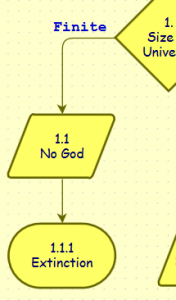 1.1. If our observable universe is finite–there is nothing outside of it and there is an end to what is in it–it is unlikely that there is a God. If there were some being who broke the limits of this universe, then it would no longer be finite.
1.1. If our observable universe is finite–there is nothing outside of it and there is an end to what is in it–it is unlikely that there is a God. If there were some being who broke the limits of this universe, then it would no longer be finite.
1.1.1. There is no way to live forever within a universe that has an end. It’s just not possible. If I hope to live forever, or act as if I hope for this, or as if I hope humanity will survive forever, then I am implicitly rejecting this kind of universe.
 1.2. An infinite universe can be infinite in many different ways. The most important for us regards the relative “sizes” of space, time, and mass/energy and the variety of laws that govern them.
1.2. An infinite universe can be infinite in many different ways. The most important for us regards the relative “sizes” of space, time, and mass/energy and the variety of laws that govern them.
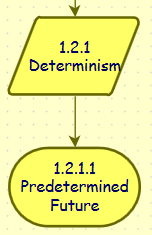 1.2.1. If the variety of possible expressions of the laws that govern the universe is smaller than the amount of stuff expressing those laws, then we are in one of those universes where everything that can happen will happen (or has happened, or is happening). “I” exist in every possible way shape and form infinitely many times. This kind of universe is strictly deterministic. Every outcome is predetermined and theoretically pre-knowable (or random and not the object of choice). Our universe may be one of these.
1.2.1. If the variety of possible expressions of the laws that govern the universe is smaller than the amount of stuff expressing those laws, then we are in one of those universes where everything that can happen will happen (or has happened, or is happening). “I” exist in every possible way shape and form infinitely many times. This kind of universe is strictly deterministic. Every outcome is predetermined and theoretically pre-knowable (or random and not the object of choice). Our universe may be one of these.
1.2.1.1. We may be able to live forever in this universe, and maybe some kind of God can exist in it, but there is only one, predetermined future that I will experience in this universe. Discussing God may be part of that future, and may even shape my experiences in that future, but nothing will change the predetermined outcome. If I believe the future is not completely predetermined, or I act as if it is not completely predetermined, than I am at least implicitly rejecting this type of universe.
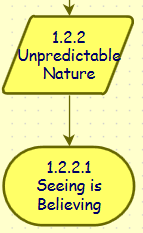 1.2.2. The observable universe where the possibilities realized by the laws of nature exceed the “stuff” (space, time, mass/energy) that express those possibilities is one almost no one believes in–at least in practice. This kind of universe will have to change its laws from place to place and time to time, or there would be no way to fit the larger number of laws inside of the smaller amount of stuff.
1.2.2. The observable universe where the possibilities realized by the laws of nature exceed the “stuff” (space, time, mass/energy) that express those possibilities is one almost no one believes in–at least in practice. This kind of universe will have to change its laws from place to place and time to time, or there would be no way to fit the larger number of laws inside of the smaller amount of stuff.
1.2.2.1. Seeing would literally be believing. Knowing that there are more laws than can “fit” within the universe would force us to distrust any sort of extrapolation, even to the point of not being sure if the law of gravity would be the same tomorrow as it is today. I listed these universes, because they are one of the logical possibilities. I don’t know anyone who believes this logic. (I have to insert a caveat here. I’m not sure, but this may be the kind of universe that Lee Smolin argues for in his book Time Reborn. However, he also has proposed a form of “cosmological natural selection” which is more consistent with one of the infinite multiverse options, although the wording may require modification.)
Alternatively, the infinite laws could be constant within some contiguous regions of the universe, making science a worthwhile endeavor in that region, but this class of universes becomes functionally equivalent to certain classes of multiverses, taking us to our second grouping.
B. Multiverses could take many forms, but for my purposes one believes in multiverses if one believes that there could be something functionally separated from our observable universe but nonetheless real. Lots of people believe this, from cosmologists to theologians, from atheists to theists. I am strongly inclined to this camp, although I can’t prove it is reality. The pattern I see in both science and life is that there is always more, once we learn to find it.
 2. Multiverses are at least infinite for all practical purposes, even if their actual numbers are only inconceivably large or converging to infinity. Our question of size thus becomes a comparison of “actuality” and “possibility”. I define “actuality” as all of the universes that have been, are, or will be. I define “possibility” as all of the universes allowed by Nature.
2. Multiverses are at least infinite for all practical purposes, even if their actual numbers are only inconceivably large or converging to infinity. Our question of size thus becomes a comparison of “actuality” and “possibility”. I define “actuality” as all of the universes that have been, are, or will be. I define “possibility” as all of the universes allowed by Nature.
 2.1. In a multiverse where actuality exceeds the possibilities allowed by Nature, reality is deterministic (see 1.2.1), and I choose not to worry about these possibilities. The future is predetermined.
2.1. In a multiverse where actuality exceeds the possibilities allowed by Nature, reality is deterministic (see 1.2.1), and I choose not to worry about these possibilities. The future is predetermined.
2.1.1. I’ll either live forever or I won’t. I’ll become a God or I won’t. My choices may (or may not) contribute to that outcome, but the outcome is determined before I make the choices. I choose not to worry about things that are already decided (when I can recognize they are and get myself to let go emotionally, of course, unless it is predetermined that I will worry about them).
 2.2. Having chosen the path where possibilities exceed actuality, we have entered a multiverse where complexity is reality, maybe even for a God. This is the reality where intelligent beings can simulate many many worlds like their own, and beings within those simulations can simulate many, many more. This is the reality where universes can make universes within black holes, and cosmological natural selection favors the universes that are best at making more universes. Of course, these scenarios could happen in deterministic universes, too, but in this multiverse, no matter how many worlds are simulated, no matter how many universes spring forth from black holes, there will always be infinitely more untried possibilities. With so many untried possibilities, it is fair to ask the question: In what percentage of the possibilities is intelligence like ours likely?
2.2. Having chosen the path where possibilities exceed actuality, we have entered a multiverse where complexity is reality, maybe even for a God. This is the reality where intelligent beings can simulate many many worlds like their own, and beings within those simulations can simulate many, many more. This is the reality where universes can make universes within black holes, and cosmological natural selection favors the universes that are best at making more universes. Of course, these scenarios could happen in deterministic universes, too, but in this multiverse, no matter how many worlds are simulated, no matter how many universes spring forth from black holes, there will always be infinitely more untried possibilities. With so many untried possibilities, it is fair to ask the question: In what percentage of the possibilities is intelligence like ours likely?
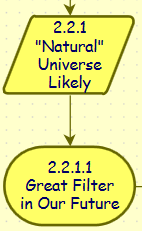 2.2.1. If it is as or more probable that intelligence like ours could arise without the intervention of other intelligence, then it is very likely we live in an uncreated universe. Of course, if we figure out how to create or simulate universes, and vastly increase the number of intelligent beings like ourselves in the multiverse, then we have broken this probability and should have followed branch 2.2.2.
2.2.1. If it is as or more probable that intelligence like ours could arise without the intervention of other intelligence, then it is very likely we live in an uncreated universe. Of course, if we figure out how to create or simulate universes, and vastly increase the number of intelligent beings like ourselves in the multiverse, then we have broken this probability and should have followed branch 2.2.2.
2.2.1.1. One of the problems with a universe where we arose by chance is the probability that the Great Filter is in our future. It is unlikely that we will live to create universes, because if we did we would be violating the probability that led to this type of multiverse and would really be in a different kind of multiverse. It seems unlikely that we could figure out how to create intelligent life without significantly increasing the rate of intelligent life creation over that of “natural” universes. We will probably go extinct if this is the multiverse we are in. I choose to hope that humanity won’t go extinct.
 2.2.2. If intelligence is unlikely to arise through undirected processes, then we have to ask the question if intelligence can arise through intelligently directed processes.
2.2.2. If intelligence is unlikely to arise through undirected processes, then we have to ask the question if intelligence can arise through intelligently directed processes.
2.2.2.1. If the answer is no, then we will never be able to create new environments which can sustain us beyond the natural heat death of this universe. We will go extinct with the pocket of the multiverse we live in. It is perhaps conceivable that we could transcend our dependence on this patch of the multiverse without learning enough or gaining the power and desire to create more universes and more intelligent life, but I personally find it hard to believe.
2.2.2.2. I find it much more believable that simulation or creation of universes is a real possibility. We aren’t there yet, and could well go extinct before we get there, but if it is possible, there are probably Gods and they probably made the vast majority of universes which contain intelligent beings. It’s a simple matter of growth rates. Over just a few generations, Gods who make universes which make more Gods will outnumber the Gods who arise by chance by such a huge number that the probability of chance Gods approaches zero. It’s like finding a really simple bacterium on a new planet and claiming that it didn’t have generations upon generations of ancestors. It’s possible that you have just found the very first bacterium on the planet, and that it arose through the random processes associated with the origins of life on that planet, but it is much more likely it is some other bacterium’s clone. We haven’t denied the possibility that our universe is the first (path 2.2.1), just that it would be unwise to bet the farm on it.
In arriving at this universe I believe in, I’ve been accused of making too many assumptions. When it comes down to it, I’ve really only made a couple that aren’t shared by most everybody. The first is that I hope we won’t go extinct. That alone removes a few possible branches from consideration. One branch is removed because I assume science is worthwhile and that we can predict some things about the universe beyond our ability to observe. I hardly consider that an assumption at all. For practical reasons I assume we aren’t in a strictly deterministic reality (including everything that is, was, and will be, not just our universe). It doesn’t seem important to me to discuss belief if the future is predetermined and those beliefs will not cause any deviation from that predetermined future. Lastly, I assume that intelligent beings can create other intelligent beings at a rate faster than the undirected workings of nature. Three assumptions. That’s all.
- We won’t go extinct.
- The future is not 100% predetermined.
- Creating intelligent beings is possible and significantly faster than waiting for them to emerge unassisted.
I believe that everyone’s practical, philosophical beliefs effectively eliminate many of these paths. Not everyone believes in the same path I do, but I believe the last path is clearly the most hopeful and worthy of exploration. It is a path where creative Gods are everywhere, where humanity might yet see a glorious future free from fear and want, and where our choices here and now are changing the future we will see. I can’t prove we are in one of these universes, but it is one more justification to trust God lives. This is a position of faith, not knowledge. I hope it is a reasoned, non-dogmatic and non-judgemental faith. It is a faith that allows me to question God and ask, what must I become to get there? God lives, but what God lives?

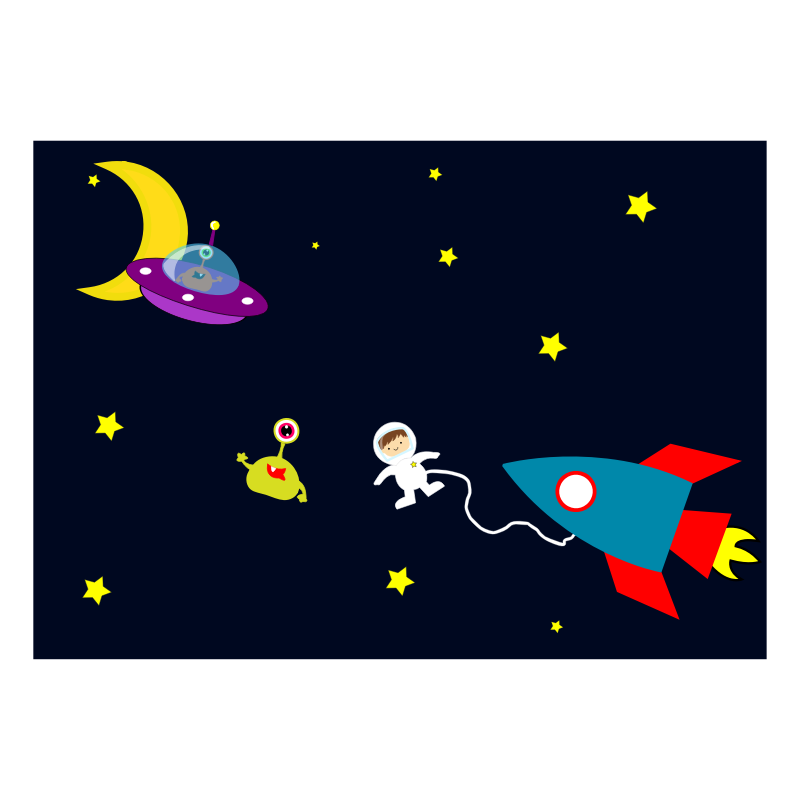
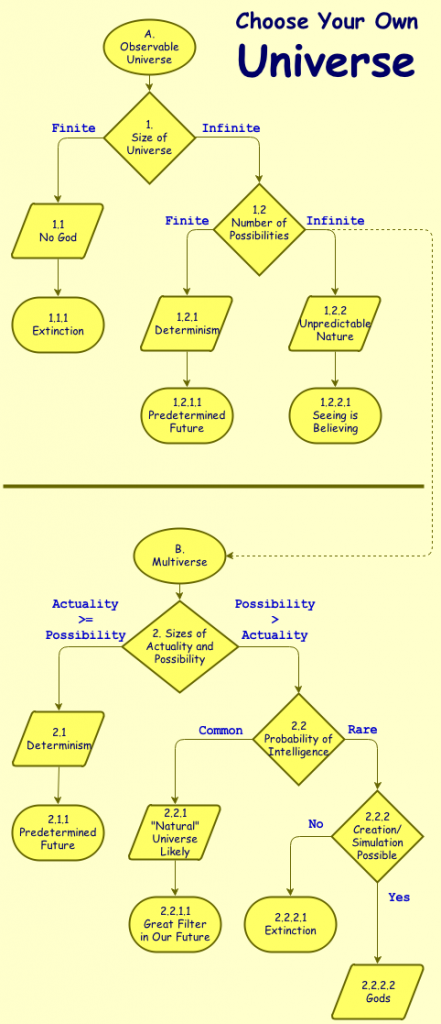



Hummm. Very interesting.. Fortunately earth/Adam and Eve Word Research needs Chemists/biologists.. Or this Jonathan Cannon may have been kicked from this Universe .. {Ha just keeping the theme moving} http://adamandevewordresearch.blogspot.com/ and http://www.adamandevewordresearch.org we search for investors/partnerships/donors/Chemists/Laboratories.. We have found the once unknown causes of ageing, and we have located the cure… Just installed three fans on my back porch, ran the wire conduit and switches, and I am now heading towards a one piece commode… Again staying with your theme of being a home repair guy on the side.. Ha .. Respect to all born of Adam/Atoms
You are a giant rider on a small elephant, my friend. Stimulating as usual.
More accurately, my elephant enjoys this type of game, but thanks, Daniel.